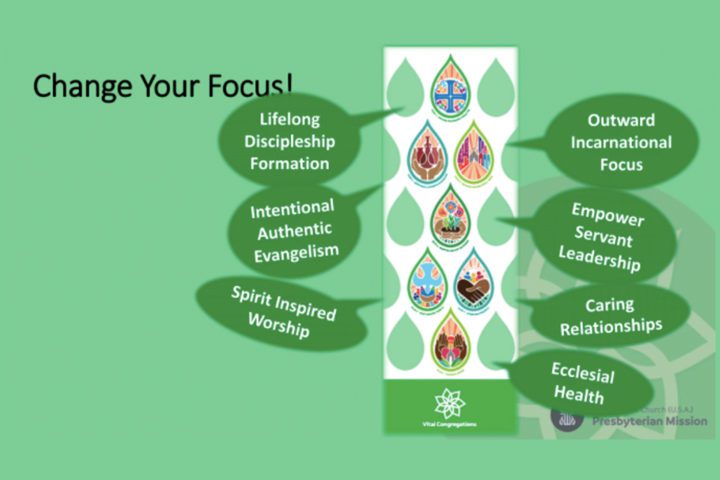During Lent, Rev Rob Stewart offers a 7-part series about the Vital Congregations Initiative entitled “7 Marks of Vital Congregations”. This is the second installment, which focuses on intentional authentic evangelism.
Evangelism. Not always a Presbyterian’s favorite word!
Yet, where would we be without “good news-ism”? Whether we embrace the word “evangelism” or whether it repels us, most of us can acknowledge that we have indeed experienced “the good news of God” in our own lives. The notion of evangelism reminds us that we have already received God’s grace. Evangelism is a celebration of God’s good news of love embracing us, lifting us up, and compelling us forward in joyful response. Evangelism may also remind us of when we first heard the good news of grace and forgiveness and then became part of the company of Christ-followers.
“We love because God first loved us.” (I John 4) Whether we grew up in a church, constantly experiencing God’s love through those around us, or whether grace and faith transformed us in a bold and brash moment, we know how God has loved us. God gives and we receive; and in our joy, we, in turn, give so that others receive. And so the cycle of blessing continues. Forever. Our job is to not block God’s cycle of giving; to not hoard; to not get in the way of God blessing the world.
I have occasionally noticed a look of terror in the eyes of some who have been asked to “evangelize” or “share your faith.” Many think that this means sharing some “doctrine of the church” or reciting creeds or confessions. Yikes!
I like to think of evangelism as our response to what God gives to us. As the Magi offered gifts to the new-born Jesus, so we offer our response to God’s gifts that we have received. “We love because God first loved us.” We return to God and show those around us our gratitude for what God has “first” done to us and for us.
The word “authentic” encourages us to consider what experience of God is uniquely mine. The word “intentional” indicates that, beyond assuming that others will know about our authentic and unique experience of God, we look for opportunities to share with others the ways that God appears to be touching our lives.
The more we take time to prayerfully (and thankfully) become aware of God’s interactions in our lives, the easier and more natural it will be for us, in everyday conversations, to share that “good news” with others. It takes awareness. It takes a bit of practice. When I begin my day by “counting my blessings,” I find joy and feel the inclination to share this with others. Moderation matters, too; no one wants to hear me bragging about how I’m am God’s favorite (no matter how strongly I may act as if I am!) What is your good news today? How is God loving you and caring for you?
Everyone likes to hear a good story. We can share our personal experiences without making others feel that we do not care about them or that our experiences are more valuable than theirs. Evangelism suggests listening as well as talking. Our genuine concern for others shows the kind of compassion that God shows us. A mutual conversation about “making sense of the world” and complaining about all the “slings and arrows” we face, can be healing and uplifting for each.
Do we notice where there is doubt, confusion, or frustration in others? What are our struggles that we can honestly confide in with others while valuing privacy? How can we be authentic? How can we intentionally engage in relationships so that we all become more loving and bring healing? And I am reminded of my new favorite question, “How can I be the answer to someone’s prayer?”
These are not just personal questions; a vital congregation will find ways to help members and friends of their congregation practice skills in sharing good news conversationally. How can our church bring good news to our neighbors?


